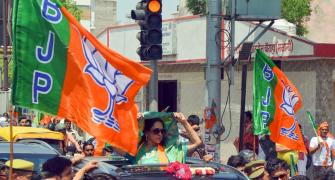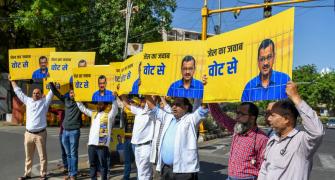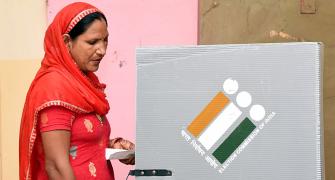The Indian situation couldn't be more surreal. As the world teeters on the brink of a war which could and radically alter Middle Eastern and global power balances, the country remains mesmerised by World Cup cricket while its politics is mired in disputes over medieval temples and mosques and the even older tradition of cow worship. In fact, what we are seeing is the further degeneration, if that were at all possible, of India's political discourse, with the suppression or obfuscation of real issues and with new forms of abuse gaining currency.
Thus, the central government itself has again raked up the Ayodhya temple issue by approaching the Supreme Court. All kinds of assertions are being made about 'proof' that a temple existed before 1528 in Ayodhya. While self-appointed sadhus with no particular base anywhere hold dharma sansads in Delhi, go on the rampage in Bhojshala in Madhya Pradesh, or distribute lethal trishuls in Rajasthan, the BJP and Congress are competing with each other on who is more loyal or holier on the issue of, all things, the Holy Cow!
Chief Minister Digvijay Singh of Madhya Pradesh, considered a dynamic and capable leader, has chosen to launch a bizarre form of 'cow protection' politics even as he has made unconscionable concessions to the VHP/Hindu Jagran Manch by wrongly allowing Hindu devotees (of no particular deity) entry into the Bhojshala structure, albeit without puja materials -- because there is nothing to worship, no divine image inside. This is a virtual repeat, on a smaller scale, of the opening of the locks to the Babri mosque for Hindu 'worshippers' in the mid-1980s, which culminated in the catastrophe of December 1992. Such appeasement of rank communalists will prove the thin end of the wedge in stoking fundamentalism.
Equally unseemly is the low-level political competition between the Congress and BJP on the issue of 'cow protection.' While the BJP is threatening to move a Bill banning cow slaughter all over the country, the Congress in Madhya Pradesh has started a campaign to glorify bovine waste products. Rajasthan and Chhattisgarh too seem headed towards promoting the cow and its milk. The attempt to invest 'cow protection' with special sanctity is fundamentally misconceived.
The Constituent Assembly debated the issue at length. Rather than prohibit cow slaughter constitutionally, it decided to include protection of bovine stock in Article 48 in the (non-enforceable) Directive Principles chapter, as only one part of a larger pledge to 'organise agriculture and animal husbandry on modern and scientific lines' with 'steps for preserving and improving the breeds, and prohibiting the slaughter, of cows and calves and other milch and draught cattle' -- including buffaloes too.
This was in keeping with the sound principle that the State should not legislate on matters of religious faith or customs. Besides, the cow is considered sacred by some strains of Hinduism, but beef is widely eaten in India, especially by low-caste people and Dalits, irrespective of their religion. For the poor, beef is an important and cheap source of high-grade protein. Contrary to what many think, empirical surveys show that at least three-fourths of all consumers of beef are Hindus.
There is thus no case for a blanket ban on killing cows -- any more than there is for enforcing vegetarianism. But the present debate is not really about protecting cows. Indian society has failed to look after its cattle -- witness the millions of animals condemned to forage through refuse and plastic, and the pathetic state of most gaushalas. The real debate is about scoring political points on an emotive issue.
The most disgusting aspect of this cynical politics is the levelling of filthy personal charges against Mr Atal Bihari Vajpayee and Ms Sonia Gandhi, both accused of eating beef. Here, deplorably, the Congress fired the first shot. And the BJP reciprocated. The net effect is a horrible diversion from problems of governance and vital issues pertaining to people's minimum needs, like water, power, housing and education. Worse, this spells further descent into vacuous identity politics. Such descent poses a real danger: pandering to the prejudices and majoritarian demands of one community, privileging its 'primacy,' and thus legitimising Hindutva as the political 'mainstream,' to which all must defer.
As India remains mired in this wasteful political contestation, the world stands at a historic crossroads. The next few weeks will determine the shape of the world order for many, many years to come. If the United States, with a handful of its loyal allies, invades Iraq -- without explicit authorisation by the UN Security Council, or by bludgeoning and manipulating it --
Among the crucially important phenomena today is the growing Atlantic Divide: serious differences between the US and Europe, or 'old Europe' as US Defence Secretary Donald Rumsfeld pejoratively branded France and Germany for opposing an invasion of Iraq. Almost all of the 46 sovereign states of Europe reject the US argument that Resolution 1441 automatically mandates the use of force (principle of 'automaticity').
Twenty-eight of them either do not support, or actively oppose, war on Iraq. The positions of the rest are either ambiguous or derive from extremely narrow calculations: crumbs offered by the US, entry into NATO, EU, etc. The bulk of these are countries of the former Soviet bloc, many of them highly susceptible to pressure, led by disoriented and reluctantly-democratic parties, and beset by terrible problems -- including battered economies, fragile state structures and discontented populations.
Western Europe is different. Of the European Union's 15 member-states, nine oppose war, including the founders of the Common Market (France and Germany). Of the rest -- Britain, Italy, Spain, Portugal, Denmark and the Netherlands -- Holland's caretaker government is at odds with the people, 72 percent of whom categorically oppose war. All these governments are under severe pressure from below. Spain saw the world's most widespread anti-war protests on February 15, with over two million participants each in Madrid and Barcelona, and with demonstrations in 55 other cities! Over two million took to the streets in Rome and London. And in November, Florence witnessed the earliest large-scale anti-war mobilisation, with half a million people.
Besides strategic divergences on Iraq, what is becoming apparent is a basic or foundational difference between the US and the EU over notions of power and the shape of the global order itself. After the Cold War, Washington has tended to bypass the UN, as in the case of Bosnia and Kosovo, or bully it. Today, it behaves as if the UN were a nuisance, which must be defied and undermined. That's what 'automaticity' is about. Underlying it is the threat the US is mounting to the edifice of multilateral institutions.
Thus, US leaders insult, chide and lampoon the UN -- arbitrarily setting it 'tests.' Mr Bush rails against the Security Council for not enforcing 'its own Resolution' on Iraq for 12 years. But he is silent on the fact that Israel has violated the far more important Resolution 242 on Palestine all the way since 1967 -- with US complicity. The US is set to undermine the UN's integrity, credibility and effectiveness -- even if that produces instability, chaos and brigandage.
By contrast, EU states act on the premise that destroying the UN's credibility isn't in the world's long-term interest. Even the mighty states need it and must exercise their power by accepting certain constraints and through 'consensus.' In balance-of-power politics, Great Powers aim not so much to achieve a decisive defensive balance as a significant degree of military and political advantage over their rivals. Their objective is not to vanquish rivals with overwhelming force. Europe by and large accepts the constraints of the balance-of-power system. The US under its ultra-conservative leadership doesn't.
The derogatory term 'old Europe' insinuates that countries like France and Germany remain mired in 'old,' outmoded thinking and values, while the US represents 'new,' forward-looking values, as the leader of the 'future' or 'coming' world. The opposite is true. The US remains stuck in jingoistic nationalism and imperial and hegemonistic notions of power. It is militarily obsessed with 'more is better.'
The EU, despite flaws, is attempting a new model: a union with open borders, shared currency, a common foreign policy, with voluntarily reduced state sovereignty. This has become possible because centuries-old feuds have been put behind in favour of cooperation. The stated criteria for EU membership include democratic governance, protection of human rights, and the unthinkability of war between members. That, surely, represents progress.
The Iraq crisis has brought US-European differences to the surface, and will further polarise them. It confronts Indian policy-makers, and the public, with new challenges and choices. It is time we shed our insularity, our cow fetishes and identity obsessions and related to the larger world -- to make a principled stand for peace, justice and sanity.








